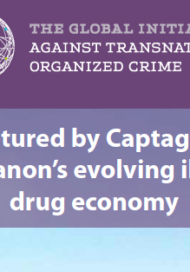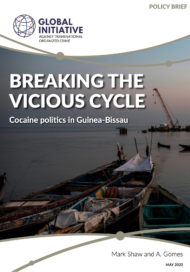This, our second of two reports on narcotics trafficking in Niger, looks at the growth in the market for tramadol, a more recent entrant into the regional drugs economy.
While the trafficking of drugs like cocaine and cannabis resin has tended to catch the attention of analysts who follow flows of narcotics in the Sahel, trafficking and consumption of synthetic opioids in the region, and specifically the analgesic tramadol, have grown exponentially in recent years.
A December 2017 report by the UN Office on Drugs and Crime, for example, found that ‘yearly seizures of tramadol in sub-Saharan Africa have risen from 300 kg to over 3 tons since 2013’.
Within this context, Niger has emerged as a key gateway for tramadol trafficked from Nigeria, where it is readily available and fuelling a widespread addiction crisis, partly due to the country’s lax monitoring of pharmaceuticals. From Nigeria, consignments of tramadol are trafficked mainly to consumer markets in Libya and, now, to a lesser extent, Niger and Mali.
During recent fieldwork carried about the Global Initiative Against Transnational Organized Crime, interlocutors in northern Niger – including individuals involved in the transport of tramadol into Libya – indicated that the proliferation of tramadol trafficking is a result of its increased availability (barriers to the tramadol market are considerably lower than the closed circuits that move high-value products like cocaine), the ease with which it can be hidden and its increasing demand for use within the region.
Several transporters (who were directly involved with migrant smuggling) told the Global Initiative that they had started to traffic tramadol, in part to make up for lost income, but also because there is a growing regional market. Those involved in smuggling and trafficking of licit and illicit goods from Niger to Libya, and vice versa, are increasingly adding tramadol to their cargo due to the growth of the tramadol economy.
According to two smugglers who transport tramadol procured in Nigeria from Agadez to the town of Sebha, in southern Libya, the price of Tramadol increases as the product moves further north. One smuggler, who is primarily based in southern Libya, said that a quantity that can be procured for about €300 in northern Nigeria can easily sell for €4.500 in Sebha. Prices fluctuate, however, depending on availability in a given area, with shortages or delays in the supply chain in northern Nigeria influencing prices all along the route to market in Libya.
Understanding the supply chain and how the networks that move tramadol through Niger remains under-analyzed and under-researched. However, according to those who have transported tramadol, and to well-placed interlocutors familiar with certain networks, the towns of Maradi and Zinder, in southern Niger, have emerged as consolidation points for tramadol smuggled out of northern Nigeria. Some interviewees spoke of how motorbike taxis are used to smuggle small quantities across the border, for consolidation once in Niger. Others, including Nigerien law-enforcement officials, indicated that couriers, often Nigerian women travelling to Libya, are paid to carry small quantities on public transport.
In and around Agadez, another main consolidation point for onward transport into southern Libya, tramadol may be repackaged to look like another product; it is then shipped in larger trucks or 4×4 pick-ups. Several interviewees said that a prominent businessman based near Agadez, who oversees a supply chain that stretches from northern Nigeria to Agadez, pays traffickers from Libya to drive 4x4s full of repackaged tramadol. Upon completion of several trips, the trafficker is allowed to keep the vehicle as part of his payment.
Much of the information about these operations was gathered during a period in northern Niger when illicit economies, of all sorts, were in flux. If anything, today, the tramadol market in Niger is one for the taking, and given its growth and the profits to be made, it is only a matter of time that this market will become enmeshed within formal and informal political structures. Researchers, analysts and policymakers, therefore, would do well to start developing frameworks that aim to provide a better understanding of the broader political economy of tramadol trafficking in Niger.
This blog draws on interviews conducted by the author in Agadez and Niamey in December 2017.
© photo [Cooper Inveen/Al Jazeera]
|
Nuevas tendencias en el contrabando de tramadol en Níger
Este segundo informe sobre el tráfico ilícito de estupefacientes en Níger hace foco sobre el crecimiento del mercado de tramadol, el ingreso más reciente al mercado regional de drogas.
Si bien el tráfico de drogas como la cocaína y la resina de cannabis han tendido a captar la atención de aquellos que estudian el narcotráfico en el Sahel, el tráfico ilícito y el consumo de opioides sintéticos en la región, especialmente del analgésico tramadol, ha crecido exponencialmente en los últimos años.
Un informe de diciembre 2017 de la Oficina de la ONU contra las Drogas y el Delito reveló, por ejemplo, que los decomisos anuales de tramadol en Africa subsahariana habían dado un salto de 300 Kg a 3 toneladas desde 2013.
En este contexto, Níger se alza como un punto de entrada clave para el tramadol proveniente de Nigeria, en donde está fácilmente disponible y alimentando una crisis generalizada de adicción, debido, en parte, a la supervisión laxa que el país lleva sobre su industria farmacéutica. Desde Nigeria, el tramadol hace su recorrido principalmente hacia sus mercados consumidores en Libia y, ahora también, aunque en menor grado, a Níger y Mali.
Durante un trabajo de campo que llevó a cabo recientemente la Iniciativa Global contra la Delincuencia Organizada Transnacional, interlocutores en el norte de Niger – entre los que se incluyen transportistas de tramadol hacia Libia – señalaron que la proliferación del tráfico ilícito de tramadol es el resultado de la mayor disponibilidad (las barreras para el mercado de tramadol son considerablemente más bajas que los circuitos cerrados que movilizan productos de alto valor, como la cocaína), la facilidad con la que puede ser oculto y la creciente demanda para su consumo dentro de la región.
Varios transportistas (directamente involucrados en el tráfico ilícito de migrantes) comentaron que habían comenzado a traficar tramadol, en parte, para compensar por los ingresos perdidos, pero también porque el mercado regional está en crecimiento. Todos los operan en el contrabando de bienes lícitos e ilícitos desde Níger hacia Libia, y vice versa, están agregando cada vez más tramadol a sus cargamentos debido al auge en este mercado.
De acuerdo con dos traficantes que transportan tramadol proveniente de Nigeria desde Agadez a la ciudad de Sabha en el sur de Libia, el precio del tramadol aumenta a medida que avanza hacia el norte. Un traficante que reside principalmente en el sur de Libia señaló que la cantidad que puede conseguirse por unos €300 en el norte de Nigeria puede venderse fácilmente por €4500 en Sebha. Sin embargo, los precios fluctúan en función de la disponibilidad, y la escasez o las demoras en la cadena de suministro en el norte de Nigeria influyen sobre los precios a lo largo de la ruta hacia los mercados en Libia.
Siguen siendo escasos los análisis e investigaciones sobre la cadena de suministro y la forma en la que las redes movilizan el tramadol a través de Níger. Sin embargo, de acuerdo con individuos que han transportado tramadol, y con interlocutores familiarizados con ciertas redes, las ciudades de Maradi y Zinder, al sur de Níger, surgen como puntos de consolidación del tramadol proveniente del norte de Nigeria. Algunos entrevistados hablaron de cómo los moto-taxis son utilizados para traficar pequeñas cantidades por las fronteras, que serán consolidadas una vez en territorio nigerino. Otros, incluyendo a oficiales de la policía de Níger, indicaron que se suele contratar couriers, usualmente mujeres nigerianas en viaje a Libia, para trasladar pequeñas cantidades en transporte público.
Dentro y en los alrededores de Agadez, otro punto principal de consolidación para su posterior viaje hacia el sur de Libia, el tramadol suele ser re-envasado y disfrazado como otro producto. Luego se lo transporta en camiones más grandes o en pick-ups 4×4. Varios entrevistados comentaron que un empresario importante que reside cerca de Agadez, que supervisa una cadena de suministro que se extiende desde el norte de Nigeria hasta Agadez, les paga a traficantes de Libia para conducir camionetas 4×4 repletas de tramadol re-envasado. Luego de completados varios viajes, les entrega el vehículo como parte de pago.
Mucha de la información sobre estas operaciones fue recabada durante un periodo en el norte de Níger cuando las economías ilícitas, de todo tipo, estaban en un estado de cambios constantes. Hoy, el mercado de tramadol es de fácil acceso y, dado su crecimiento y los beneficios que de él pueden obtenerse, es sólo cuestión de tiempo hasta que se entremezcle con las estructuras políticas formales e informales. Investigadores, analistas y formuladores de políticas deberían comenzar a desarrollar marcos que procuren ofrecer una mejor comprensión de la economía política general del tráfico de tramadol en Níger.
Este artículo se vale de entrevistas conducidas por el autor en Agadez y Niamey en diciembre de 2017.
© fotografía: Cooper Inveen/Al Jazeera



